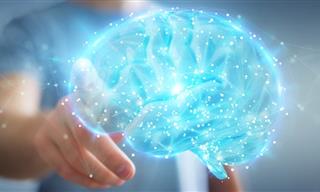|
As you age, it's natural that things in the body start to go downhill. Your back aches, your knees creek a little more, and you’ll find there are days where you have to concentrate just a little bit more to get the job done. But when it comes to the brain, we have every reason to actively ensure it stays vital and functioning.
Scientists are continuously discovering new ways in which this amazingly complex organ works, and a lot of the factors that trigger age-associated cognitive decline can be thwarted with conscious lifestyle choices. Here are 8 behaviors that can help you naturally slow down degeneration and improve the overall health of your brain.
|
|
|
|
1. Exercising the body helps the brain
Exercise has been shown to reduce the risk of developing brain disorders. Exerting your body physically can change the way your brain protects your memory and thinking skills, and facilitates information processing. Aerobics, for example, boosts the hippocampus, the part of the brain responsible for encoding short-term memory, learning and verbal memory.
When you exercise, your heart rate speeds up, leading to an increased blood flow and more oxygen being pumped into the brain, allowing your neural networks to connect faster. This also stimulates the release of hormones that promote the growth of new brain cells.
|
| Source |
 |
|
2. Sleep
The brain is just as active when you’re sleeping as when you're awake. During rest, your brain resets itself and important processes relating to learning, decision-making and memory retention occur.
Sleep deprivation impairs alertness and injures neurons. It has also been shown to cause irreversible damage to the brain. A link has been found between sleeping less than 7 hours a night and cognitive decline, as well as memory loss. New research has found that power naps are extremely helpful in restoring brain power and offsetting the negative effects of sleep deprivation.
Another important function the brain performs while you sleep is clearing out toxins. Researchers found that amyloid plaque, a protein found in the brains of Alzheimer’s patients, is reduced during sleep.
|
|
3. Vitamin D
This vital vitamin plays an important role in your brain’s health. It protects neurons, nursing damaged ones back to health and facilitating nerve growth. It is also involved in planning, processing information and memory retention. Studies have shown a strong link between vitamin D deficiency and a risk of dementia. Known as the sunshine vitamin, it can be produced by your body with daily exposure to the sun. During the winter months, or if you live in a cold climate, supplements can be taken. For more information about vitamin D, click here.
|
 |
|
4. Listen or play music
 Music is relaxing and good for your brain, as it improves your memory focus and verbal fluency. Listening to music as we age is regarded as a mental exercise and helps keep our mind mentally sharp. Playing an instrument or getting musical training have shown even better results for memory recall. Music is relaxing and good for your brain, as it improves your memory focus and verbal fluency. Listening to music as we age is regarded as a mental exercise and helps keep our mind mentally sharp. Playing an instrument or getting musical training have shown even better results for memory recall.
A study at the University of South Florida, in Tampa, observed the effect of piano lessons on adults aged 60-85. After 6 months of lessons, there were vast improvements in memory, planning, speed of information processing, and other cognitive functions.
Studies have looked into how listening to music strengthens your memory retention. Researchers found that listening to classical music with a 60-beats-per-minute pattern helped activate both sides of the brain, which caused it to process information more efficiently, and maximized both learning and retention. It seems that music is not only a mood booster, but it's also beneficial for the health of your brain in general.
|
| Source |
|
|
|
5. Healthy gut flora
Your brain works together with your gut. Millions of good bacteria live in the digestive system, and they help ensure your body functions properly. The gut also contains neurons that are responsible for producing serotonin, a feel-good hormone. If you consume too many refined carbohydrates, sugars, and processed food, your healthy bacteria get destroyed. This affects your brain’s mood and behavior, as well as its overall health.
You can optimize your gut flora by taking probiotic supplements or switching to a diet heavy in fermentable fibers. Probiotics protect the body against pathogenic bacteria that would like to take up residence in your gut. You can also try eating more beans, blueberries, broccoli and other leafy greens, polenta or bananas.
|
| |
|
6. Laugh
Laughter certainly makes life more fun, but did you know it’s beneficial to brain function? Interacting with others and laughing activates a wide range of regions in the brain. Studies have shown that the memory of people with active social lives declines at a slower rate. This is because laughter activates areas of your brain that relate to learning, focus and creativity. It’s beneficial for your brain to be more outgoing. Be active, volunteer or join a club, and keep yourself surrounded by people who know how to laugh!
|
 |
|
7. De-stress
When you are stressed, your body goes into survival mode and the brain produces more adrenaline and cortisol. The body usually resets itself when the stress is over but if you’re constantly under stress the adrenaline and cortisol will wreak havoc on your system. For the brain, these can block the formation of new neural connections. In effect, this shrinks your brain size and affects your memory.
Stress also limits your mental flexibility, causes General Adaptation Syndrome (A.K.A. burnout) and causes your brain to forget how to fight stress. One way to help with stress is through relaxation - any activity that quiets your mind and makes you feel more at ease. This can be through meditation, Tai Chi, yoga, or a walk outdoors. Recent studies have found that being in nature helps improve cognitive function and reduces stress.
|
| Source |
|
|
8. Brain-friendly food
You can optimize your brain’s health simply by changing your diet. Nutritionists have even developed The Mind Diet, an eating plan which promotes brain health. Eating the right foods with strong doses of vitamins and minerals can actively help your brain function better.
Fresh fruit, vegetables and green tea for antioxidants – These phytochemicals work to protect your brain cells from getting damaged by free radicals. Antioxidants also have an anti-aging effect on the skin. Regularly consuming antioxidants can even enhance your memory and focus. Blueberries, cranberries, and red grapes are particularly strong sources of antioxidants.
Omega-3 fatty acids to slow degeneration – These fatty acids are known to help with memory and can help prevent the onset of Alzheimer’s. These good fats have also been shown to protect the brain against the damage caused by junk food, which typically prevents new brain nerve cells from being formed. Because your body isn’t able to produce these helpful acids on its own, you need to get them through your diet. They are found in abundance in fish like herring, salmon, and sardines.
Vitamin B12 to counter brain shrinkage – This vitamin boosts nerve health. A deficiency in B12 has been linked to brain shrinkage. When you don’t have enough B12, you’ll experience mental fogginess and difficulties concentrating. To keep your mind sharp, consume plenty of fish, shellfish, liver, eggs and dairy products, which all offer healthy doses of B12.
Coconut oil for brain energy – Your brain needs energy to function regularly and to avoid brain atrophy. Usually, glucose is one of the best sources of energy for the brain as it is easily converted. Ketone bodies can do the same job as glucose and help prevent brain tissue degeneration. Coconut oil is rich in ketone bodies and is a delicious addition to your diet.
|
 Go to BabaMail
Go to BabaMail




 Music is relaxing and good for your brain, as it improves your memory focus and verbal fluency. Listening to music as we age is regarded as a mental exercise and helps keep our mind mentally sharp. Playing an instrument or getting musical training have shown even better results for memory recall.
Music is relaxing and good for your brain, as it improves your memory focus and verbal fluency. Listening to music as we age is regarded as a mental exercise and helps keep our mind mentally sharp. Playing an instrument or getting musical training have shown even better results for memory recall. 





















